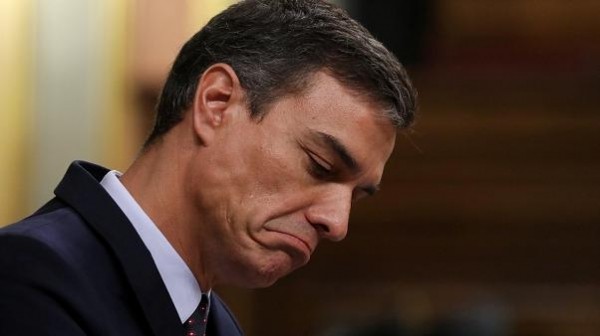
Copyright REUTERS/Sergio Perez
Spain’s acting Prime Minister Pedro Sanchez has embarked on a last-ditch mission to get out of the political stalemate and avoid the fourth national election in as many years.
Spain has been in political limbo since an inconclusive election in April left Spanish socialist party (PSOE) leader Pedro Sanchez without a majority to form a government.
However, the election deadline is getting closer. If parliament does not confirm Sanchez as prime minister by Monday, September 23, Spain will have to hold another election on November 10.
King Felipe has been carrying out consultations with party leaders who will tell him if they would back Sanchez’s bid to become premier.
Normally, these talks are just a formality because everyone knows ahead of time how the others are going to vote in what is known as the “investiture vote”.
But this time, things are different because for the first time none of Spain’s largest parties — PSOE, the Popular Party (PP). center-right Ciudadanos (Citizens) and far-left Unidas Podemos — know how the others are going to vote.
If no solid candidate emerges in the coming days, parliament will be dissolved next week and a general election will be called.
What is fueling the political impasse?
After inconclusive April elections, it became clear that no political party would be able to govern without forming a coalition.
Spanish socialists won the elections with 28.8% of the votes — that’s 123 seats out of the 350 that make up the Spanish parliament.
Despite three months of talks, it hasn’t managed to reach a deal on forming a coalition with Podemos.
The negotiations became deadlocked on the question of what role and what power Podemos would have in a new government. Each side accused the other of negotiating in bad faith.
Juan López Uralde is an MP from Podemos and a member of the group’s negotiating team. He told Euronews: “It is clear the work of both negotiations team is over, we have gone a far as we can go, it is now in the hands of both the party leaders, Pedro Sanchez, and Pablo Iglesias.”
Podemos leader Pablo Iglesias reaffirmed on Tuesday that he would only support Sanchez’s bid to become premier if he agrees to a coalition government.
According to Spanish electoral legislation, the candidate needs an absolute majority of votes in the first round or failing that, a simple majority of more affirmative than negative votes in a second round.
The Socialists have repeatedly rejected any agreement on a coalition government with Podemos.
So it is not likely at all that Podemos’ 35 MPs will vote in favour of Sanchez, which would make abstentions by other parties irrelevant.
Speaking at a news conference, Iglesias also said it would be “reasonable” for King Felipe to give more time to talks ahead of a deadline next Monday.
Would a Podemos-PSOE coalition be enough?
Even if PSOE was able to strike a coalition deal with Podemos, they would still be missing ten seats to reach a majority. This means they would need the support of smaller left-wing parties such as the Catalan independentists, Esquerra Republicana de Catalunya (15), Junts per Catalunya (7), and the Basque Nationalist Party PNV (6).
In Sanchez’s last investiture in July, which he lost, Esquerra Republicana voted for Sanchez.
Opinion polls show a new election might not end the impasse, with the Socialists still unable to win enough seats to secure a majority on their own.
Ciudadanos offer
In an unexpected plot twist on Monday, Ciudadanos leader Albert Rivera offered to abstain at the investiture vote, which would help Sanchez achieve a simple majority in the second round. An abstention gives less chance of getting negatives votes. Ciudadanos is the third-largest party in parliament with 57 seats.
However, Sanchez would have a high price to pay for Ciudadanos’ support.
Rivera said he would facilitate Sanchez’s investiture as premier under a number of conditions.
The Ciudadanos’ leader wanted Sanchez to promise not to increase taxes, apply direct rule again in Catalonia if the regional government doesn’t accept an upcoming sentence in a separatist trial and stop governing in the region of Navarra with the support of far-left secessionist Basque nationalist party Bildu.
Sanchez responded his party was already fulfilling the conditions. But Ciudadanos accused him of lying in his response and said it could back him only if he complied with all their demands.
“His response … is a joke on all Spaniards. I’m asking him to rectify, to go back to constitutionality and allow to unblock Spain,” Ciudadanos leader Albert Rivera wrote on Twitter.
What does Sanchez need to do?
He needs to reach a last-minute deal with either Unidas Podemos or with Ciudadanos.
Any investiture session will have to take place this weekend, before parliament is dissolved on September 23 and a new election called on November 10.
